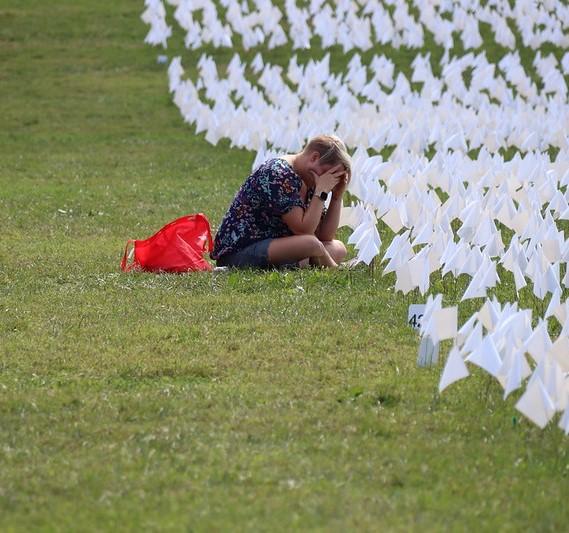The Biden Administration observed a grim milestone today as the country topped 1 million COVID-19 deaths.
In other pandemic news, a senior White House official got some heat about projecting 100 million new cases by next winter, and the country cohosted a second Global COVID-19 Summit to battle the current pandemic and better prepare the world for the next major health threat.
Urging vigilance
As President Joe Biden marked 1 million American lives lost to COVID-19, he acknowledged the pain of their survivors and urged the public to remain vigilant against COVID-19, especially while the nation has supplies of tests, vaccines, and treatments.
"It's critical that Congress sustain these resources in the coming months," he said in a statement. Biden also acknowledged the milestone in remarks to the second Global COVID Summit and ordered flags to be flown at half-staff.
Biden's comment about resources alludes to a Congressional impasse, with a $10 billion bill to fund the next stage of tests, treatments, and vaccines stalled in the Senate, according to the Washington Post.
Controversial cold-weather estimates
In a related development, a projection that senior administration officials have recently floated that 100 million COVID-19 infections could occur over the fall and winter is raising some scientific skepticism, CNN reported today.
Last week, a senior official shared to 100 million prediction at a background briefing, part of a push to get the nation ready for future surges and sway Congress to approve Biden's COVID-19 funding request, according to the Washington Post.
Ashish Jha, MD, White House COVID-19 response coordinator, also mentioned the 100 million infection projection during a May 8 interview on ABC's Sunday news show "This Week."
However, White House officials haven't shared details on how they came up with the number, catching some involved in the administration's COVID response off-guard and with some public health experts raising issues with the projection.
CNN reported today that a senior administration official said the 100 million number is a moderate scenario that falls between conservative and extreme predictions, assuming no new funding and no dramatically new variants.
The University of Minnesota's Michael T. Osterholm, PhD, MPH, told CNN that the modeling data needs to be more transparent and that there are too many unknowns 6 months out—such as changes in the virus that can emerge suddenly—that could change the course of the pandemic. He also said he was concerned that the warning may be part of a desire to pressure Congress to approve the funding request.
Osterholm is director of the Center for Infectious Disease Research and Policy, publisher of CIDRAP News.
Meanwhile, COVID-19 activity in the United States continue to grow, with 163,335 cases and 949 deaths reported yesterday, and the 7-day average of daily cases at 84,329 with daily deaths at 327.
Rising COVID-19 in the Northeast has prompted some school districts to reinstitute mask mandates, and an analysis of federal data by ABC News said a growing proportion of US deaths are among vaccinated people.
Global Summit nets new funding
The second Global COVID-19 Summit today, hosted by the United States and four of its partners, raised more than $3.1 billion from countries, organizations, corporations, and philanthropic groups to help end the pandemic and boost preparedness against future health threats, the White House said in a statement. Cohost countries are Belize, Germany, Indonesia, and Senegal.
The funds are above previously announced pledges and include $2 billion for the current COVID response and $962 million for a new pandemic preparedness and global health security fund at the World Bank.
The pledges came from the African Union and 39 countries, as well as commitments from several groups, which include pharmaceutical companies and organizations such as the Bill and Melinda Gates Foundation, the Coalition for Epidemic Preparedness Innovations (CEPI), and Wellcome Trust.
The United States committed an additional $200 million to the preparedness fund and built on earlier commitments for vaccine purchases and vaccine research and development.





















